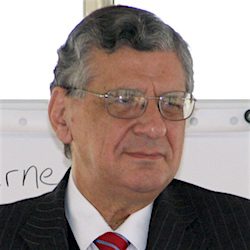The Navigating the Era of Uncertainty executive online training is created to help diplomats and business leaders effectively address rapid technological advancements that impact every aspect of our lives, from the way we communicate with our loved ones, to the way we conduct business.
As expected, diplomacy and policy are not immune to digital advancements and disruptions, on the contrary: The stakes are much higher and are expected to have geostrategic consequences, which is why countries are developing digital foreign policies and recognising digital as a core issue for their diplomatic and international relations. In the meantime, tech companies are engaging in setting norms and developing guidelines for the use of emerging digital technology such as AI and lethal autonomous weapon systems (LAWS).
Diplo’s executive training will equip you with the necessary skills and tools that address current and future challenges in a relevant, informed, and comprehensive way.
- ✓ Start noticing the predictable trends of the seemingly unpredictable era that lies ahead
- ✓ Prepare yourself for an active role in shaping our common AI-driven future
- ✓ Equip yourself with skills necessary to navigate the ever-changing field of digital policy
- ✓ Gain deeper insights of new trends in emerging tech, business, diplomacy, and international relations
- ✓ Explore how technology changes our world and the way we conduct business
In this 10-day intensive and interactive online executive training you will learn about:
- The future of multilateralism and negotiation in the digital world
- The use of big data and AI in diplomacy and policymaking
- Best ways to present your arguments, views, and build relations online
- How and if tech development can be governed
- The emergence of digital foreign policies
For applicants who enrol in Diplo’s Master in Contemporary Diplomacy programme, offered in cooperation with University of Malta, the Navigating the Era of Uncertainty executive training is part of their studies and counts towards their degree.
Who should apply?
This training is especially designed for:
- Mid-level and senior business professionals, diplomats, policymakers, international civil servants, parliamentarians, and civil society leaders
- Technology executives and journalists working in the tech field
- Those working in the field of digital diplomacy, or plan to move into this fast-developing field in the future
- Scientists, technologists, and experts who address critical global challenges and are in need of diplomatic tools and skills to effectively participate in global forums where decisions about the future are being made
In short, we are taking a multistakeholder approach, bringing together a diverse pool of actors with a stake in the future of diplomacy and digital technology!
Training schedule and experts
Training schedule
The training will be delivered following the below schedule within two sessions per day, each lasting for 2 hours, and a 1-hour break in between.
1 February [11:00-13:00 UTC, 14:00-16:00 UTC]
The Basics of Visual Analysis and Production
2 February [11:00-13:00 UTC, 14:00-16:00 UTC]
Protocol and Etiquette: Between tradition and innovation
3 February [11:00-13:00 UTC, 14:00-16:00 UTC]
Negotiation Skills II
4 February [11:00-13:00 UTC, 14:00-16:00 UTC]
Presenting to Your Public: Giving a voice to your message
7 February [11:00-13:00 UTC, 14:00-16:00 UTC]
Artificial Intelligence and International Relations
8 February [11:00-13:00 UTC, 14:00-16:00 UTC]
Building Relations
9 February [11:00-13:00 UTC, 14:00-16:00 UTC]
Digital Governance: Cybersecurity, digital economy, and human rights online
10 February [11:00-13:00 UTC, 14:00-16:00 UTC]
Negotiating and Deciding: Overcoming divides and navigating ‘uncertainty’ of the modern era
11 February [11:00-13:00 UTC, 14:00-16:00 UTC]
Hybrid Meetings: Technology, security, psychology, and effective moderation
Training experts
The training is delivered by an international faculty of senior experts. We have assembled ambassadors, leading scholars, and inspirational workshop facilitators. They are knowledge- and thought-leaders in the field of technology and diplomacy, and practitioners who put their vast experience into use on a daily basis.
Ljupčo Jivan Gjorgjinski
Senior Advisor for Multilateral Affairs, Ministry of Foreign Affairs of North Macedonia
Martin Rauchbauer
Former Austrian Tech Ambassador in Silicon Valley, Former Austrian Consul in San Francisco and Co-Director at Open Austria
Methodology and fees
This entirely online executive training is highly interactive and includes participant-driven debates, exercises, and simulations. Expect the unexpected but don’t expect traditional lectures.
The course fee is €2000 per participant.
You may choose to attend all course sessions or a selection of sessions and design your own training programme.
The fee for the individual courses’s session is €300 per session.
We offer an institutional group discount of 10% for three or more participants from the same institution.
Note: Diplo alumni can benefit from a 15% discount on the fee for this course.
Contact
For more information, please contact Mr Andrej Skrinjaric, Educational Programmes Director, at andrejs@diplomacy.edu.




















